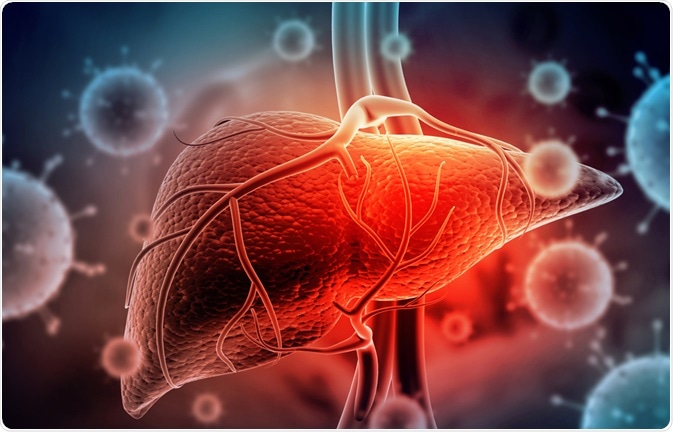Viral Hepatitis
Types of Viral Hepatitis
Viral infections of the liver classified as hepatitis include hepatitis A, B, C, D, and E. Different viruses are responsible for each type of virally transmitted hepatitis.
Hepatitis A is always an acute, short-term disease, while hepatitis B, C, and D are most likely to become ongoing and chronic. Type E is usually severe but can be particularly dangerous in pregnant women.
Hepatitis A
This type is caused by an infection with the hepatitis A virus (HAV). This type of hepatitis is commonly transmitted by consuming food or water contaminated by feces from a person infected with hepatitis A.
Symptoms:
You can get the first symptoms anytime between 15 and 50 days after you came in contact with the virus. But they usually show up between about 2 and 4 weeks later. The symptoms include:
- Fatigue
- Sudden nausea and vomiting
- Abdominal pain or discomfort (on the upper right side beneath your lower ribs)
- Clay-colored bowel movements
- Loss of appetite
- Low-grade fever
- Dark urine
- Joint pain
- Yellowing of the skin and the whites of your eyes (jaundice)
- Intense itching
When to see a doctor:
Make an appointment if you have any of the symptoms and you recently:
- Traveled out of the country, especially to anywhere without good sanitation
- Ate at a restaurant that reported a hepatitis A outbreak
- Find out if someone close to you, like a roommate or caregiver, was diagnosed with hepatitis A
- Had sex with someone who has hepatitis A
- Ate raw shellfish
- Used illegal drugs
Treatment:
Type A hepatitis has no cure, but it is treatable, and usually clears up on its own within a few months.
It can be treated with a vaccine, and there are two types of hepatitis A vaccine.
The first type is administered as a two-shot series with the first dose given on day 0, (i.e the day when the first shot is received) and the second dose is given 6 months after.
The other type is a combination vaccine that protects you against both hepatitis A and hepatitis B. The combination vaccine can only be given to anyone above 18, and it’s given as a three-shot series over 6 months.
Bed rest may be recommended if symptoms cause a great deal of discomfort. However, if you experience vomiting or diarrhea, follow your doctor’s orders for hydration and nutrition.
Hepatitis B
Hepatitis B is a potentially life-threatening liver infection caused by the hepatitis B virus (HBV). It occurs in nearly every part of the world but is more common in some countries in Asia, Africa, South America, and the Caribbean. It is called the silent killer because globally 95% of people with hepatitis are unaware of their infection, and people remain asymptomatic in most cases.
Hepatitis B is also known as serum hepatitis because the virus is present in large amounts in the blood and serum of an infected individual compared to other body fluids such as saliva, sweat, and urine.
Hepatitis B spreads through contact with infected blood, semen, or other bodily fluids. It spreads easily through sex and needles/syringes contaminated with infected blood. It can also be transmitted from mother to child during childbirth.
Symptoms of Hepatitis B:
Most people do not experience symptoms when infected. But if you have infectious forms of hepatitis that are chronic, like hepatitis B and C, you may not have symptoms in the beginning until the damage affects liver function. 15%–25% of individuals chronically infected with Hepatitis B will go on to develop chronic liver disease. The symptoms include:
- Abdominal pain
- Dark urine
- Fever
- Joint pain
- Loss of appetite
- Weakness and fatigue
- Yellowing of your skin and the whites of your eyes (jaundice)
Treatment:
Unlike what most people believe, having Hepatitis B is not a death sentence. Although it has no cure, the viral load can be reduced to the barest minimum if managed properly.
Acute hepatitis B doesn’t require specific treatment. but chronic hepatitis B is treated with antiviral medications and vaccines.
The Nigerian government introduced the hepatitis B vaccine into the National program for immunization (NPI) schedule in the year 2004.
The hepatitis B vaccine is generally given as a three-dose series with the first dose given on day 0 (the day when the first shot is received), the second dose given 1 month after dose 1, and the third dose given 6-months after the dose 1.
The hepatitis B vaccine is safe and effective and it is recommended for both infants and adults.
Hepatitis C
The hepatitis C virus is spread when someone comes into contact with blood from an infected person. This can happen from birth, or through sharing needles, syringes, or any other equipment used to prepare and inject drugs.
People can also get infected by sharing glucose monitors, razors, nail clippers, toothbrushes, and other items that may have come into contact with infected blood, even in amounts too small to see. Although not common, hepatitis C can spread during sex, especially among men who have sex with men.
Hepatitis C is not spread by sharing eating utensils, breastfeeding, hugging, kissing, holding hands, coughing, or sneezing. It is also not spread through food or water.
Symptoms of Hepatitis C:
5%-25% of individuals chronically infected with hepatitis C will develop liver cirrhosis over 10–20 years. Other symptoms include:
- Bleeding easily
- Bruising easily
- Fatigue
- Poor appetite
- Jaundice
- Dark-colored urine
- Itchy skin
- Fluid buildup in your abdomen (ascites)
Treatment:
Only Hepatitis C is curable as treatment can reduce the viral load to undetectable, which is considered cured. Currently, there is no vaccination for hepatitis C. Treatments of hepatitis C usually involve just 8–12 weeks of oral therapy (pills) and cure over 90% with few side effects.
People who develop cirrhosis (scarring of the liver) or liver disease due to chronic hepatitis C may be candidates for a liver transplant.
Related: Everything You Need To Know About Cervical Screening And Pap Smear
Hepatitis D
Also called delta hepatitis, hepatitis D is a severe liver disease caused by the hepatitis D virus (HDV). It is contracted through direct contact with infected blood. Hepatitis D is a rare form of hepatitis that only occurs in conjunction with hepatitis B infection. The hepatitis D virus can’t multiply without the presence of hepatitis B.
Symptoms of Hepatitis D:
- Jaundice
- Joint pain
- Abdominal pain
- Vomiting
- Loss of appetite
- Dark urine
- Fatigue
Treatment:
Currently, no antiviral medications exist for the treatment of hepatitis D. It can be prevented only by getting the vaccination for hepatitis B, as infection with hepatitis B is necessary for hepatitis D to develop.
Hepatitis E
This type of hepatitis is a waterborne disease caused by the hepatitis E virus (HEV). Hepatitis E is mainly found in areas with poor sanitation and typically results from ingesting feces that contaminate the water supply.
Symptoms of Hepatitis E:
- Fever
- Fatigue
- Loss of appetite
- Nausea
- Vomiting
- Abdominal pain
- Jaundice
- Dark urine
Treatment:
Currently, no specific medical therapies are available to treat hepatitis E. Because the infection is often acute, it typically resolves on its own. People with this type of infection are advised to get adequate rest, drink plenty of fluids, get enough nutrients, and avoid alcohol. However, pregnant women who develop this infection require close monitoring and care.
Tips to prevent hepatitis
Getting vaccinated is the best way of preventing hepatitis B infection. You can also prevent hepatitis through:
Hygiene:
Practicing good hygiene is one way to avoid contracting hepatitis A and E. If you’re traveling to a developing country, you should avoid local water and ice, raw or undercooked shellfish (e.g., clams, mussels, oysters, scallops), and raw fruit and vegetables.
To prevent Hepatitis B, C, and D, avoid:
- Sharing drug needles
- Sharing razors
- Using other people’s personal care items like a toothbrush
- Touching spilled blood
- Getting a tattoo or piercing from an unregulated provider.
- Sharing straws, notes for snorting drugs, and
- Do not get Medical or dental interventions without adequate sterilization of equipment.
Hepatitis B and C can also be contracted through sexual intercourse and intimate sexual contact. Practicing safe sex by using condoms can help decrease the risk of infection.
What should hepatitis patients avoid?
- Saturated fats in butter, sour cream, and other high-fat dairy foods, fatty cuts of meat, and fried foods.
- Limit food and drinks with added sugars such as cookies, cake, and soda.
- Foods with a high level of salt
- Alcohol
- Avoid inhaling fumes from paint, paint thinners, glue, household cleaning products, nail polish removers, and other potentially toxic chemicals.
Also,
- Talk to your health care provider before starting any herbal remedies or vitamin supplements because they can interfere with your prescribed hepatitis B drugs or even damage your liver.
- Check with your pharmacist about any over-the-counter drugs (e.g., paracetamol) or non-hepatitis B prescription drugs. Before taking the drugs, make sure they are safe for your liver since many of these drugs are processed through the liver.
Related: How To Prevent Cancer In Your 40s: The 11 Best Ways
Non-Viral Hepatitis
Non-viral hepatitis is an inflammation of the liver that can cause scarring in the liver (cirrhosis), liver cancer, liver failure, and death. There are three types of non-viral hepatitis:
- Alcoholic hepatitis – caused by drinking too much alcohol.
- Autoimmune hepatitis, is caused by the immune system attacking the liver. The immune system can attack the liver for unknown reasons, causing inflammation, liver scarring, liver cancer, and liver failure. Some diseases and certain toxic substances and drugs can cause this to happen.
- Toxic hepatitis – caused by chemicals, drugs (prescription and over-the-counter), and nutritional supplements.
Symptoms of non-viral hepatitis
Symptoms of non-viral hepatitis can appear within hours, days, or months of exposure and may include:
- Jaundice (yellowing of skin and eyes)
- Abdominal pain
- Nausea and vomiting
- Dark-colored urine
- Itching and rash
- Fatigue
- Loss of appetite
Treatment of Non-viral hepatitis
Treatment for toxic hepatitis may include:
- Stopping exposure to the substance that caused it
- Taking medication
- Receiving a liver transplant
To treat your symptoms, your doctor may prescribe a drug to reduce liver inflammation or you may need treatment in a hospital.
Related: Marburg Virus: The Complete Guide To Symptoms, Treatment, And Prevention
Treatment for alcoholic hepatitis includes:
- Specific treatment with corticosteroids to reduce inflammation of the liver
- Nutritional support
- Stop drinking alcohol as that is the only way to prevent liver damage from getting worse. Stopping drinking is not easy, especially as an estimated 70% of people with alcoholic hepatitis have an alcohol dependency problem.
Treatment for autoimmune hepatitis:
Autoimmune hepatitis is diagnosed by blood tests. Sometimes a liver tissue sample (biopsy) is required. Treatment includes medication to stop the immune system from attacking the liver. If the liver is severely damaged, a transplant may be necessary.
In conclusion, if you think you are at risk from either hepatitis B or C, it is important to get tested. A specific test is required for each, so do not assume that you have been tested in a routine health check. You can book a health and wellness package from Medbury to get tested for viral or non-viral hepatitis.









No Comments